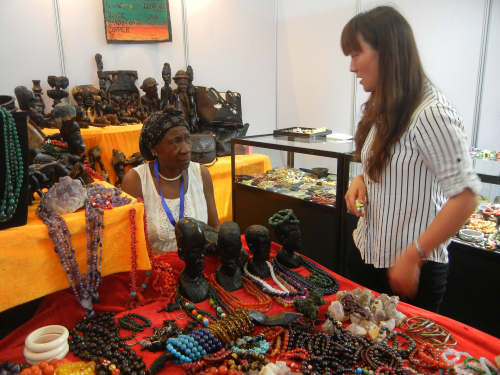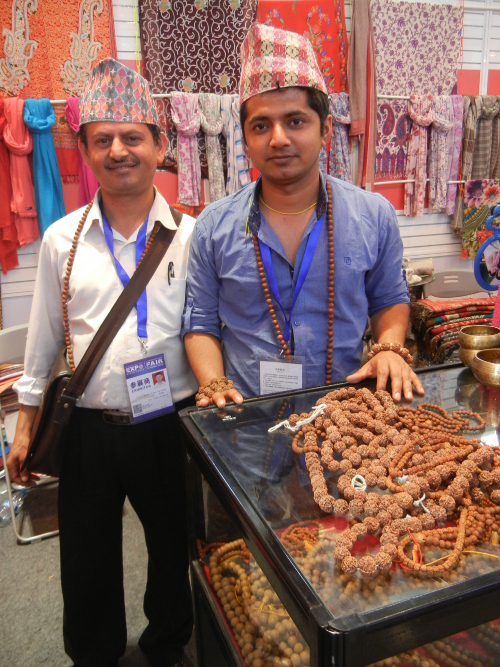 |
|
Zambian Celstine Chilamba is a regular at the different Chinese trade fairs. Her Magna General Trading has three booths at the Third China-South Asia Expo, selling precious stones and handicrafts (SUDESHNA SARKAR) |
"Come and taste the sweetness of India," beckoned the Indian trader, holding out a platter on which nestled small, white flattened balls. They were sandesh, a traditional Indian sweet made of thickened milk and synonymous with celebrations. The adventurous in the crowd around him broke off little pieces, popping them gingerly into their mouths and then breaking out in delighted smiles.
In another part of the Kunming Dianchi International Convention and Exhibition Center, two strapping Ghanaians beat their drums with gusto, creating an irresistible foot-tapping rhythm. Their companion, a nubile young woman balancing a carved pot on her head, swayed her hips to the beat, making the passersby halt and watch in rapt attention.
And close to the earthy scene but oblivious to it, a devout Vietnamese was lighting sandalwood joss sticks and laying them with veneration at the feet of an exquisitely carved wooden Buddha, who watched the activities around him with a serene smile.
These were some of the many images that coalesced in a riot of colors and sounds to form the Third China-South Asia Expo 2015 and 23rd Kunming Import and Export Fair hosted by Kunming, capital of Yunnan Province in southwest China, from June 12 to 16.
Started in 1993, the fair has become more than an annual trade event. It is the forerunner of the vision Chinese President Xi Jinping announced in 2013: creating the Silk Road Economic Belt based on the ancient trade route that ran from Xi'an City in the east to the Mediterranean in the west, and the 21st-Century Maritime Silk Road. The object of the initiatives is to increase exchanges and cooperation between Asia, Europe and Africa for common development and peace.
Yunnan is already doing that. "Yunnan was an important part of the ancient Silk Road, lying at the junction of three economies, China, Southeast Asia and South Asia," said Chen Hao, Governor of the province. "Using its geographical location and resources it can be an international corridor connecting China and the international community." The expo is that corridor.
In 2014, China's trade with South Asia was worth $106.1 billion; Chinese investment in the region amounted to $8 billion. Vice President Li Yuanchao said the target is to raise the trade to $150 billion and investment to $30 billion in the next five years and further open up markets for mutual benefit.
The expo is helping in that too. This year, about 300 deals worth $55 billion were clinched, the lion's share of them domestic. The opening day saw a record $25.19 billion turnover, 19.8 percent increase year on year, according to Xinhua News Agency. The international deals involve companies from the United States, Japan, France, Italy, Thailand, Myanmar and Laos.
Testing the China market
It was Tophan Patnaik's first visit to China. The former insurance agent from India's Orissa Province, known for its beaches and temples, had decided to chuck his job and become an entrepreneur one year ago.
With his savings and a loan from his father, Patnaik started Pace Ventures, a husband-wife enterprise selling handicrafts and hand-spun scarves and wraps. "I am not focusing on sales," he said. "I just want to showcase our products, test the market, and see which items buyers fancy."
"This year, most of the Indian exhibitors are from the small and medium enterprises (SMEs) following Prime Minister Narendra Modi's program to promote SMEs," said S.C. Ralhan, President of the Federation of Indian Export Organizations. "China is a huge market for India and exports include a diverse range of products, from engineering goods to carpets and handicrafts."
Ralhan said Modi's visit to China in May and the slew of bilateral agreements signed during the three days have given a boost to Indian participation in the expo. "We had a very good show last year with almost 100 companies taking part," he said. "This year, with India being the theme country, there's greater participation. Most of the Indian provinces are taking part in the expo."
India's Minister of State for External Affairs V. K. Singh had a message, "Invest in India. Make in India." The Indian Government, he said, has embarked on a path to facilitate businesses. Besides, this year is Visit India Year in China. In 2016, it will be Visit China Year in India.
Visitors also eyed Chinese investors. Sabera Ahmed, Vice Chairperson-Bangladesh of Women Entrepreneurs' Council at the South Asian Association for Regional Cooperation Chamber, was hoping Chinese companies would set up base in Bangladesh. "Chinese companies are seeking to relocate their manufacturing bases outside China where labor and other expenses are cheaper," Ahmed said. "We are asking them to come to Bangladesh. We have a young and trained workforce. We can make superior products designed in China. In the past, the designs were made in the United States or Europe and manufactured in Bangladesh. Now, let's have Designed in China, Made in Bangladesh."
 |
|
Even as tremors continue to rock Nepal, Nepali traders have turned up at the Third China-South Asia Expo in Kunming to keep business going in the hope of rebuilding their devastated economy (SUDESHNA SARKAR) |
Business without borders
It was Hoang The Son's first Kunming expo. The Vietnamese represented Ha Suvimex, a clam-exporting company established in the 1980s that changed hands from government to private ownership in 2009.
"Our main market was Europe," Hoang said. "But with the economic downturn in Europe and the depreciating dollar, we are shifting to Asia. The focus is China since it is a huge market and has the same high interest in sea food as Viet Nam."
Though called the China-South Asia Expo, the five-day fair, like the Silk Road, goes beyond borders. This time it was attended by over 20,000 businessmen and 3,000 enterprises from nearly 70 countries and regions.
There was a strong contingent from the Association of Southeast Asian Nations (ASEAN), especially Thailand, which was the guest of honor.
"We have come to do a market survey and get distributors and wholesalers," said Pimpimol Swat-Xuto from the Foundation for Thai Entrepreneurship Development. About 192 Thai entrepreneurs were present at the expo. "We love to come to Kunming because it is the center of south China and the fair is open to all entrepreneurs," the consultant said. "Though we would love to get buyers from other countries if possible, China alone is big enough for us."
There were traders beyond ASEAN--from New Zealand and Australia, Europe and Africa.
Zacchaeus Tusubira, a 28-year-old Ugandan, is no stranger to China or the fair. He buys electronic items and garments from Shenzhen, selling them back home in Kampala and coming back with semi-precious stones and African drums. Sometimes he doesn't recover his cost but he regards it as necessary investment to promote his products.
Borders have been becoming even more blurred at the expo. Chinese businessman Li Yuhang is selling Sri Lanka's famed Dilmah brand of flavored teas and marketing Spa Ceylon through his Kunming Rabbit Trading Co.; businesswoman Lin Wenqin's Airichel Co. is selling seeds of the African "magic tree," the Moringa oleifera, which forms the base of African traditional medicine and is said to be able to cure over 300 diseases; Ghanaian Enock Azu is hawking chocolates from Kazakhstan. Ghana and Kazakhstan? The 24-year-old shrugged. "This is business," he said.
But business, however thriving, is not the be all and end all; building rapport is. Chinese Vice President Li emphasized it was important for countries to work closely. "We need to foster amity and strengthen political trust," he said, adding "A close neighbor is better than a distant relative."
Haji M. Amin Tarakhil, Commissioner General of Afghanistan of Exhibition and Economic Growth under the Ministry of Commerce and Industries, echoed Li.
"We take part also in the fairs in Chengdu, Urumqi, Beijing and Shanghai," said Tarakhil, who led a delegation of about 40 Afghan companies. "We will take part in the Kunming expo every year. China is a neighbor and a friend. It is important for us to be good friends with our neighbors."
(Reporting from Kunming, Yunnan Province)
Comments to liuyunyun@bjreview.com
